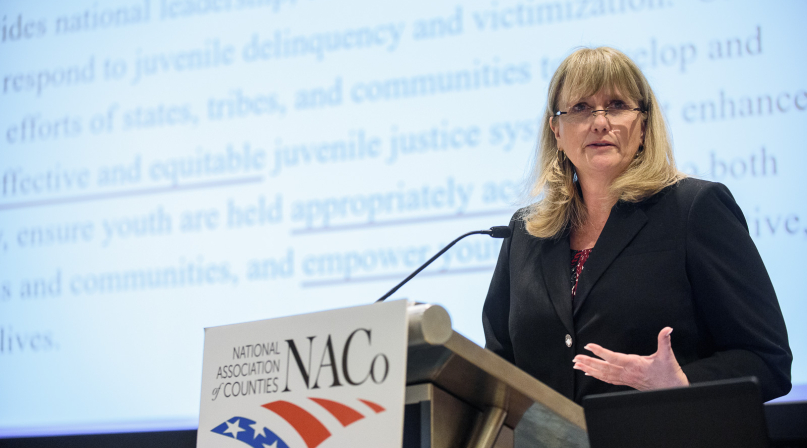DOJ grants: 'Identify a need in your community'

Key Takeaways
Andre Bethea, policy advisor for Corrections and Reentry, Justice Department, has a message for counties: “I can’t make awards if you don’t apply — creativity is on you,” he told members of NACo’s Justice and Public Safety Policy Steering Committee Saturday morning at the kick-off to the association’s annual Legislative Conference.
“Identify a need in your community,” he said. “There is a great deal of flexibility.”
Bethea, a former 911 operator in New York early in his career, amazed members with his ability to recall grant activity in each state and discussed with members which states and counties were actively seeking and getting grants, and which were not.
Members heard from federal partners and policy experts on the latest developments in justice-related policy issues. Discussion topics included the outlook for implementation of the Juvenile Justice Delinquency Prevention Act and the Second Chance Act, passed in the closing days of the 115th Congress.
“I’m for pushing funding outside of the beltway,” Caren Harp, administrator, Office of Juvenile Justice Delinquency Prevention, Justice Department, told the audience.
Several members of the committee had questions for Harp about prevention funding for girls and women since they’re seeing an uptick in crime in that demographic. Harp told them there’s $2 million a year to spend nationwide, and some said they thought that amount was too low. Harp said to be sure to let their representatives in Congress know if they need more funding in that area.
Attachments
Related News

California counties fight agricultural crime
Sheriffs' offices and prosecutors in California's central valley make specific efforts to prevent and prosecute crimes against the agricultural community.

DHS funding set to lapse, putting key county partners at risk of a partial shutdown
The U.S. Department of Homeland Security (DHS) is headed toward a funding lapse at 12:01 a.m. ET on Feb. 14 after the Senate failed this week to advance legislation to fund DHS for the remainder of Fiscal year (FY) 2026.

SBA issues new rule affecting local permitting in post-disaster rebuilding
The U.S. Small Business Administration (SBA) has issued an interim final rule that changes how rebuilding projects financed with SBA disaster loans following a Presidentially declared disaster interact with state and local permitting requirements.
